|
|
|
Sort Order |
|
|
|
Items / Page
|
|
|
|
|
|
|
| Srl | Item |
| 1 |
ID:
093952
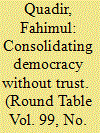

|
|
|
|
|
| Publication |
2010.
|
| Summary/Abstract |
This paper makes a departure from the dominant formalistic approach to 'democratic consolidation' to explore a range of issues, especially mutual distrust and misperception, to analyse why Bangladesh's quest for democracy remains elusive. By taking a closer look at the events that led to the collapse of democracy in 2007, it provides new insights into the failure of relevant political actors to reconcile their personal and political differences in order to give democracy a chance to take root in the country's seemingly dysfunctional political landscape. It suggests that the emergence of what can be called the politics of distrust was a major factor in the breakdown of democracy in 2007. Moving the debate beyond the practice of holding free and fair elections on a regular basis, it is argued that Bangladesh's prospect for fostering a democratic political culture depends on the ability of rival political actors to make concerted efforts to build credible, well-functioning legal and political institutions that cultivate a culture of trust not only among political parties but also between the democratic state and the ordinary citizens.
|
|
|
|
|
|
|
|
|
|
|
|
|
|
|
|
| 2 |
ID:
077228
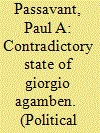

|
|
|
|
|
| Publication |
2007.
|
| Summary/Abstract |
I argue that Giorgio Agamben employs two, contradictory theories of the state in his works. Earlier works, such as The Coming Community and Means without End, suggest that the state today functions as an aspect of the society of the spectacle where spectacle is the logical extension of the commodity form under late capitalism. This part of Agamben's work attributes a determined character to the state and a determining power to the economic forces of capitalism that conditions particular forms of the state. Later work, such as Homo Sacer: Sovereign Power and Bare Life and State of Exception, are preoccupied with the logic of juridical sovereignty and the increased frequency of states of emergency. This part of Agamben's work attributes a determining strength to the state under current conditions. Although his earlier work provides a more coherent narrative of how it is possible to move from contemporary society to ideal community, it does not provide the theory of political action necessary to overcome the power of the state he describes when he theorizes the state in Homo Sacer and State of Exception. None of the three possibilities of political action present in his later works provides passage beyond state sovereignty without violating his philosophical commitments.
|
|
|
|
|
|
|
|
|
|
|
|
|
|
|
|
| 3 |
ID:
182475
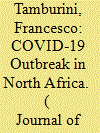

|
|
|
|
|
| Summary/Abstract |
North African nations, especially Egypt, Algeria, and Morocco, have been heavily affected by COVID-19 if compared to other African countries. Governments in North Africa took proactive legal measures to manage the virus threat, safeguarding population health, but also triggering repressive and invasive mechanisms that in some cases jeopardized basic freedoms and rights. This work will analyze comparatively the anti-COVID-19 legislations, pointing out how the legislative measures mirrored the level of transition of democracy, the opacity of some regimes, exploitation of the pandemic to foster repressive control, and highlighting the weakness of new democratic institutions unprepared to balance health security and democracy.
|
|
|
|
|
|
|
|
|
|
|
|
|
|
|
|
| 4 |
ID:
171188


|
|
|
|
|
| Summary/Abstract |
This article examines the Kenya Colony administration’s use of communal labor as a punitive, coercive labor practice during the Mau Mau rebellion of the 1950s. Faced with the Mau Mau rebellion, the administration transformed the preexisting communal labor system and began to use it on an unprecedented scale as a form of collective punishment against the mainly Kikuyu African civilian populations thought to be in collusion with the Mau Mau guerrillas. Communal labor, which was previously justified as a building block of development and used widely throughout the colony as cooperative village labor, now became an aspect of the punitive “rehabilitation” of the Kikuyu populace in Central Province. Although colonial officials directed Emergency communal labor against all of the African civilians living in the rural areas of Central Province thought to be in tacit support of Mau Mau, women were the corps of most of the communal labor work parties. As a result, this article examines the role of gender in the British administration’s wielding of communal labor as a punitive measure in Central Province during this time period. This window into the machinations of communal forced labor also sheds more light on the wider issue of gender and forced labor during the colonial period in Africa.
|
|
|
|
|
|
|
|
|
|
|
|
|
|
|
|
| 5 |
ID:
148025
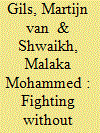

|
|
|
|
|
| Summary/Abstract |
Film production has for a long time been a prominent medium for Palestinians to resist Israeli occupation and create a cultural memory. Though there are some academic studies on the subject, a critical framework of analysis for such films remains underdeveloped. This article argues that Palestinian film production has surged particularly in recent years as part of an increasingly globalised dimension to Palestinian resistance, alongside such initiatives as the Electronic Intifada and the BDS movement. Early Zionist rhetoric asserted the non-existence (or invisibility) of Palestinians. Several decades later, when the Arab revolt was shut down, the Israeli official propaganda largely shifted to a discourse of “emergency”, which decontextualizes the anti-colonial nature of Palestinian resistance. The films 5 Broken Cameras (2011) and Private (2004) both engage with Israeli colonialism and the state of emergency by acting as tools of witnessing, laying bare the occupational strategies the Israelis use under emergency law and revealing the arbitrary nature of such practices as the Separation Wall. The films challenge Israeli authority through their depictions of predominantly non-violent forms of resistance, which counters their historically constructed invisibility as a people, as well as the colonialist narrative of “terrorism”. Non-violent resistance makes the recognition of Israeli authority problematic, as the settlers cannot use brute force to drive out the Palestinians if there is no documented incident in context to justify violence. Furthermore, the article argues that the form of the films – pseudo-documentary and especially “talking witness” documentary – enables their emotive content to reach out to an international audience, which could potentially respond. Thus, the films not only contain acts of resistance, but they significantly are tools of resistance in the conflict.
|
|
|
|
|
|
|
|
|
|
|
|
|
|
|
|
| 6 |
ID:
131858
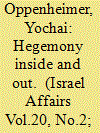

|
|
|
|
|
| Publication |
2014.
|
| Summary/Abstract |
This article examines the political protest expressed by Nathan Alterman over the years in poems published in the newspapers. It argues that this criticism identifies with the hegemonic political values rather than articulate alternative ones, in an attempt to nurture self-criticism on the part of the government regarding its failures and mistakes. This type of criticism seeks to preserve the reigning hegemony from within and to ensure that it projects an image of moral rectitude.
|
|
|
|
|
|
|
|
|
|
|
|
|
|
|
|
| 7 |
ID:
151492
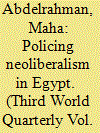

|
|
|
|
|
| Summary/Abstract |
This article examines the increasing power of the police, their centrality to the reproduction of the neoliberal global order and their dynamic relationship with various elements of the ruling elite. It focuses on the case of the post-2011 uprising in Egypt to examine how the police institution has taken advantage of the uprising to increase its power and relative autonomy. The article demonstrates the centrality of the police to the Sisi regime’s efforts at reducing political discourse to an inflated and simplistic concept of ‘security’ in an attempt to establish its long-term legitimacy.
|
|
|
|
|
|
|
|
|
|
|
|
|
|
|
|
| 8 |
ID:
173191
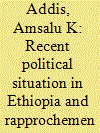

|
|
|
|
|
| Summary/Abstract |
This article is designed to provide an overview of the historical and contemporary relations between Ethiopia and Eritrea as well as to examine the recent geopolitical situation and the perception of local people in Ethiopia. This paper is mainly based on secondary data analysis of the available secondary information and news reports, online articles, academic literature, interviews and discussions. The Ethio-Eritrea war brought political, economic and social security threats to the Horn of Africa. Although the economy in Ethiopia is at the developing stage, recent protests have shaken the country to its core. Since 2015, anti-government protests have been triggered over freedom of the press, land rights, under-represented seats in the coalition parties, and horizontal inequality in economic, political and social affairs among ethnic groups across the country. In this study, it is established that the unrestrained political circumstance of the current regime has created dissension and violence among the public, and thus led to escalating political, economic and security crises in Ethiopia. If this issue is not rectified quickly, the peace in the country may be jeopardised. Another issue is that although Ethiopia-Eritrea rapprochement is appreciated, the agreement between both leaders and their foreign policy orientation is still unclear.
|
|
|
|
|
|
|
|
|
|
|
|
|
|
|
|
| 9 |
ID:
180690
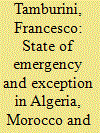

|
|
|
|
|
| Summary/Abstract |
This paper shows how the constitutional provisions related to the state of emergency and exception, although they are contained within democratic traditions, were set to operate in Algeria, Morocco and Tunisia as a mechanism of basic control and maintenance of liberal autocracies. The state of emergency model was used for the survival of regimes in times of instability and social unrest, leading in some cases to the suspension of human rights for many years. Nevertheless, these provisions were modified or lifted when the regime had to show a more convincing stake to the democratic process in 2011.
|
|
|
|
|
|
|
|
|
|
|
|
|
|
|
|
| 10 |
ID:
185185
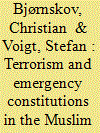

|
|
|
|
|
| Summary/Abstract |
Previous research has indicated that constitutionalized emergency provisions effectively constrain the behaviour of democratic governments subsequent to terrorist attacks. In this article, we ask if this is also true for autocratic governments. Are non-democratic governments equally subject to constitutionalized constraints regarding their reactions to emergencies and particularly to terrorist attacks? To answer the question, we analyse the behaviour of a specific group of predominantly autocratic governments that are particularly subject to frequent terrorist incidents, namely the states that are members of the Organisation of Islamic Cooperation. Employing data on terrorist activity from the Global Terrorism Database and constitutional data from the Index of Emergency Powers, we estimate the association between constitutionalized constraints and terrorist attacks in a dataset covering 48 member-states of the organization observed annually between 1970 and 2014. As hypothesized, we find that emergency constitutions that politically make it relatively cheap for governments to declare a state of emergency are more likely to be invoked. In addition, we find that governments are more likely to increase repression after terrorist events when the constitution allocates more discretionary power to the government in emergencies. Our evidence thus suggests that emergency constitutions also impact on the behaviour of largely autocratic governments.
|
|
|
|
|
|
|
|
|
|
|
|
|
|
|
|
| 11 |
ID:
172334
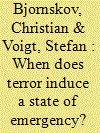

|
|
|
|
|
| Summary/Abstract |
The relationship between terrorist activities and states of emergency has never been explored in a cross-country perspective. This article is a first step to change that. Given that a terror act has been committed, what are the factors that lead governments to declare a state of emergency (SOE)—or refrain from declaring it? And given that a SOE has been declared, what are the effects thereof? On the basis of seventy-nine countries all having Western-style constitutions, we find that more terrorist incidents increase the likelihood of a SOE. Interestingly, emergencies are less likely to be declared in election years, supposedly because governments believe them to be unpopular. Once a SOE is declared, it generally leads to substantially more government repression. Finally, countries already under a SOE are more likely to suffer from additional terror attacks, challenging the effectiveness of states of emergency.
|
|
|
|
|
|
|
|
|
|
|
|
|
|
|
|
|
|
|
|
|